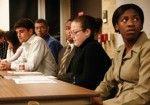Texas A&M sophomore civil engineering major Brandon Lewis was tired of all of the talks about multicultural education. He wanted real action.
“We oftentimes talk about the issues, but not enough actions are taken,” Lewis said. “The reason that (people) only address the policies is (because) it is the first and easiest step.”
In Sterling C. Evans Library Monday night, student panelists and audience members – including Lewis – demanded action, but disagreed over the source of the responsibility. The meeting marked the third seminar in the Series of Multicultural Education Resources and Discourses in a Global Society, sponsored by the Texas A&M Libraries and The Race and Ethnic Studies Institute.
Panelists disagreed over whether the University or students should play a bigger role in multicultural education. Some insisted that the key to multicultural education was to force-feed diversity to students who have not been previously exposed to it, and that actions by the University were crucial to its success.
Student Body President Jackson Hildebrand said the University has taken steps to address the issue of diversity. He also attributed the lack of multicultural concerns to the lack of knowledge to multicultural events on campus.
Hildebrand pointed to the empty seats in the room and said, “This room isn’t full – not because (the students) resist – they just don’t know about (the event).”
President of International Graduate Student Association Marie Leonard, a graduate student in sociology, said the University has not done enough to promote and fund diversity programs on campus, especially study abroad programs.
Junior finance major Whitney Leggett said that in a world of rapid globalization, students have no choice but to change and adapt to different cultures. She said this is something the University should help them with.
“Texas A&M has not set diversity as an educational goal,” said junior history and political science major Amanda Payne.
Others said multiculturalism is mainly a personal responsibility, and that individuals and student organizations need to take the helm in its effort.
“It is important to make a joint effort,” said junior community health major and President of the African American Student Coalition Venton C. Jones Jr. “The student body needs to learn to come out of (its) comfort zones.”
President of Asian Presidents’ Council Nikita Guo, a senior electrical engineering major, said the need to address multicultural education derives in a large part from the need for multicultural knowledge of students after graduation. The University should provide the resources, but students must ultimately seize the opportunities, she said.
The panelists and the audience agreed that achieving a diversified student body must be a two-sided effort.
“I think The Battalion and other student organizations need to make sure that (multicultural events) are publicized,” Lewis said. “And students have to be receptive and attend these events.”
Diversity in action
November 16, 2004

0
Donate to The Battalion
Your donation will support the student journalists of Texas A&M University - College Station. Your contribution will allow us to purchase equipment and cover our annual website hosting costs.
More to Discover








